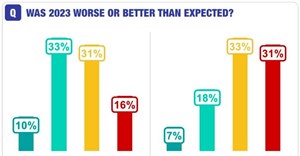
Related

What you need to know about the new direct marketing guidance note
Nadine Mather and Chloë Loubser 3 days




2 critical challenges the market research industry needs to overcome when using AI
Dr Nikolai Reynolds 12 Jun 2024



Only six in ten (63%) internet users on average across the 20 countries included said they trust the internet. This is down 11 percentage points since a similar survey was conducted in 2019. The singular exception is Japan, which showed a 7 percentage-point increase in trust. But Japan is the rare exception, as the findings reveal that Internet trust shrunk by double-digits in India (-10 points), Sweden (-10), Kenya (-11), the United States (-12), Canada (-14), Brazil (-18), and Poland (-26). (A complete list of countries surveyed and details about the survey methodology and those who were questioned can be found below.)
Privacy was a major concern for those surveyed. Seventy-nine percent expressed worry about their online privacy.
Many felt that Internet governance was lacking. Slightly more than half (57%) said the Internet was effectively governed. But fewer than half in Great Britain (45%), the U.S. (45%), France (41%) and Israel (34%) felt this way.
In Germany, trust in the Internet fell to 61%, down 9 points from 2019. This is slightly below the international average of 63%, but higher than in Canada (57%) and the U.S. (54%).
“The survey clearly shows distrust in the largest communication and information network humankind has ever created,” said Dr. Christian Kastrop, programme chair, socio-economic transformation, at The New Institute. Dr. Kastrop is a former German Federal State Secretary for Digital Society and Consumer Policy. “Clearly, Internet users want concrete and effective policies that will empower and protect them.”
Amid privacy concerns and rapidly declining worldwide trust, Internet users were calling for new regulations to effectively strengthen online privacy. They also wanted better control over how their personal data was collected and used.
Respondents indicated that the most effective policies to improve trust in the Internet should include:
“It’s all about empowering Internet users and listening to their concerns as the Internet revolution continues to evolve,” says Dr. Paul Twomey, initiative lead at The New Institute. “There is growing global desire by individuals to protect the access to and use of their online personal data, not just for privacy but also to improve direct benefits to individuals and expand positive societal outcomes.”
“There’s little doubt that we are witnessing a steady global erosion of user trust in the Internet. And that scepticism is being driven by concerns about data privacy and security”, said Dr. Fen Hampson, a visiting fellow at The New Institute and a Chancellor’s Professor at Carleton University in Ottawa, Canada. “The survey makes it abundantly clear that there is broad support for regulatory and technical innovations aimed at giving online citizens control over their own data. And it is also clear that is vital to restoring trust in the internet.”
Only two African countries were included in the 20-country study, namely South Africa and Kenya. In Kenya seven in every 10 (70%) expressed trust in the internet. South Africans were no different to those in the rest of the world about their trust of the internet, with 63% agreeing that overall, they trust the internet. In line with findings in other countries of shrinking trust in the internet, this showed a decline of 9 percentage points since 2019. Could this opinion be impacted by the worry of online security, with only 47% of South Africans and 43% of Kenyans saying that overall, online security was sufficient?
Citizens’ concerns about online privacy ranked very high, with 93% in Kenya and 88% in South Africa voicing their concerns – considerably higher than the 79% overall country average. In Kenya there was an increase of 49 percentage points in this indicator since 2019.
Probing whether South Africans and Kenyans thought the internet was effectively governed, almost six in ten in both countries - Kenya (59%) and South Africa (57%) - agreed. Notably, Kenyans were more positive than South Africans about new government policies to improve internet trust, but it must be kept in mind that overall internet access in Kenya is currently at only 30%. (Internet penetration in Kenya grew rapidly over the last few years – from 17% in 2015 to the current level.)
Internet penetration is much higher in South Africa , where 7 in 10 South Africans had access to the internet in 2020 – this is still growing rather rapidly and currently Ipsos proprietary figures indicate that internet access is in the region of 77%.
The majority of Kenyans (89%) and South Africans (75%) agreed that policies to protect internet user privacy would improve trust in the internet.
“In both Kenya and South Africa citizens are looking to government policies to protect them on the internet, but in our opinion a fine balance needs to be maintained between freedom of speech and stricter government policies so as not to suppress or deny freedom of information access and flow in our democracies,” says Mari Harris, knowledge director in sub-Saharan Africa.

